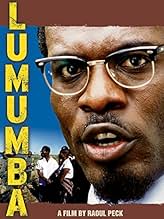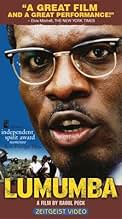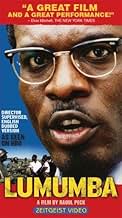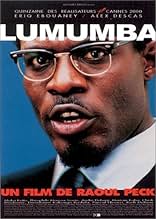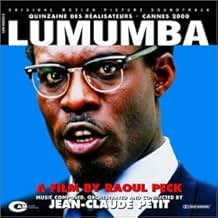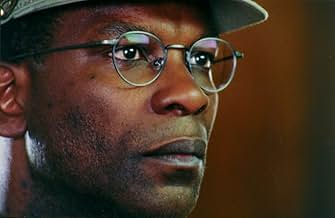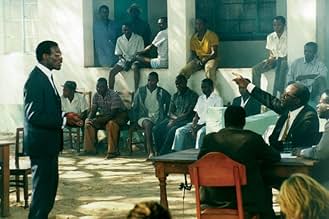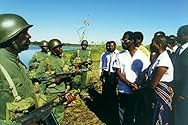IMDb RATING
7.2/10
2.2K
YOUR RATING
The true story of controversial leader of independent Congo Patrice Lumumba.The true story of controversial leader of independent Congo Patrice Lumumba.The true story of controversial leader of independent Congo Patrice Lumumba.
- Director
- Writers
- Stars
- Awards
- 3 wins & 8 nominations total
Théophile Sowié
- Maurice Mpolo
- (as Théophile Moussa Sowie)
Makena Diop
- Thomas Kanza
- (as Oumar Diop Makena)
Dieudonné Kabongo
- Godefroid Munungo
- (as Dieudonné Kabongo Bashila)
Pascal N'Zonzi
- Moïse Tshombe
- (as Pascal Nzonzi)
- Director
- Writers
- All cast & crew
- Production, box office & more at IMDbPro
Featured reviews
This movie was intended to explore the powers that resisted and ultimately ended Lumumba's political movement in the Congo with historical accuracy. Although it goes to great lengths to meet that end, it falls horribly short in two major ways. One, the CIA is mentioned just one time. Two, JFK is portrayed as though he authorized Mubutu's "offer" of a military takeover. This is despite the fact that Lumumba was killed three days before JFK became president! With the information now available (read JFK: Ordeal in Africa by Richard Mahoney), there is no doubt that the Dulles brothers using the CIA were chiefly responsible for Lumumba's assassination. Kennedy was heartbroken by the news and understood and advocated for a united Congo much like Lumumba did, opposing Eisenhower and the CIA. Not to mention the Belgians and British. Although one could argue these points do not have a major impact on the movie, they are critical to understanding not just the Congo during that period, but the intense internal conflict in the United States between large interests (Wall Street represented by CIA) and JFK's vision for the world (third world independence and development, anti-imperialism).
I was a pre-teen when news of Lumumba's assassination hit the news so I very vaguely recall at the time it was sad a leader who tried to shuck the reigns of colonialization was killed for efforts towards independence.
There is woefully insufficient time in a 2 hour movie to completely explain the whos whys and wherefores of a political assassination. Suffice to say the victors write the history and even if the truth were portrayed adequately, who's truth would it be? As the character Lumumba says in the movie, he came 50 years too early.
I found the story fast paced with good production values. It mirrored the all too brief time in power for a promising African leader, and there is a dearth of them lately. That continent still suffers a vacuum in its leadership, a state that will take another century to rectify. The film and life of Lumumba is a lesson of how badly things can go wrong in a climate of conflicting objectives and numerous parties and forces acting in a volatile setting. Congo had just gained independence and tribal rivalry reared its head very quickly. It is suggested for example that Lumumba seek sanctuary in the province of Katanga, where months before he had been refused landing rights in a flight to visit the troubled area. Politics makes strange bedfellows.
The time of the 1960s was the height of the cold war and Lumumba's courting of Soviet aid to fast track his country did not win any favours. No doubt the superpower USA had at least some hand in his death, much the same as Ngo Dhin Diem in Vietnam around the same time. Attempts to assassinate Fidel Castro at that time are also well documented so it may be some measure of just desserts that Kennedy met his end with an assassin's bullet.
Read up on that period of history then watch the movie to get additional value for the time you invest, and then you will be prepared to better understand contemporary events in far off places when national interests are at stake. Oil, diamonds, bauxite, coffee, whatever; liberty always seems to take a back seat when these interests get the ear of the powers that be.
Realism in the film is reinforced with the french dialog. I also understood the subtleties having studied military coups in university under a black professor who came from Nigeria.
There is woefully insufficient time in a 2 hour movie to completely explain the whos whys and wherefores of a political assassination. Suffice to say the victors write the history and even if the truth were portrayed adequately, who's truth would it be? As the character Lumumba says in the movie, he came 50 years too early.
I found the story fast paced with good production values. It mirrored the all too brief time in power for a promising African leader, and there is a dearth of them lately. That continent still suffers a vacuum in its leadership, a state that will take another century to rectify. The film and life of Lumumba is a lesson of how badly things can go wrong in a climate of conflicting objectives and numerous parties and forces acting in a volatile setting. Congo had just gained independence and tribal rivalry reared its head very quickly. It is suggested for example that Lumumba seek sanctuary in the province of Katanga, where months before he had been refused landing rights in a flight to visit the troubled area. Politics makes strange bedfellows.
The time of the 1960s was the height of the cold war and Lumumba's courting of Soviet aid to fast track his country did not win any favours. No doubt the superpower USA had at least some hand in his death, much the same as Ngo Dhin Diem in Vietnam around the same time. Attempts to assassinate Fidel Castro at that time are also well documented so it may be some measure of just desserts that Kennedy met his end with an assassin's bullet.
Read up on that period of history then watch the movie to get additional value for the time you invest, and then you will be prepared to better understand contemporary events in far off places when national interests are at stake. Oil, diamonds, bauxite, coffee, whatever; liberty always seems to take a back seat when these interests get the ear of the powers that be.
Realism in the film is reinforced with the french dialog. I also understood the subtleties having studied military coups in university under a black professor who came from Nigeria.
Congo is a sad country which started with massive disadvantages (King Leopold used it as his private route to personal wealth) and never recovered.
The Belgians made little provision for independence, but that is not unusual in Africa and other countries have managed OK despite a bad start. Congo never did.
A combination of tribal and ethnic conflicts, underhand colonial behaviour and Cold War politics meant that failure was inevitable. Lumumba was brutally murdered by his own countrymen with America and Belgium cheering from the sidelines.
Lumumba never had a chance and he made it worse for himself by delivering an un-programmed and fiercely anti-colonial speech on Independence Day. This is not made too clear in the film - you have to listen really hard to know that that is what was happening. As a result of that unwise speech, he destroyed his relations with the Belgians and gave the Congolese people hopes and expectations that could never be realised.
He also made an enemy of the leader of the Katanga region.
He was thus regarded by his own people as having reneged on promises after an impossibly short time in Government and then, having been publicly and privately brutalised by Congolese troops, finally murdered by the Congolese leader in Katanga, who ordered two Belgian policemen to dig up and destroy the body. All true and faithfully, if gruesomely, repeated in the film.
Everyone comes out badly in the film - which is only right and proper. Belgians for practising apartheid before the word was invented to cover the Boers in SA. How could anyone operate a system where, as a native, you had to be assessed to see if you had developed (`evolved' - shades of Darwin) sufficiently to be licensed to have wine in your house?
The Americans come out rather lightly in the film. Maybe it was not known at the time the film was made that the CIA station chief (Devlin, not Carlucci) was sent poisoned toothpaste to introduce into Lumumba's bathroom cabinet (he didn't). By order of Eisenhower.
The Congolese come out worst of all, appropriately, since in the long term they are the ones who also suffered (and continue to suffer) the most as a result of not being able to act together irrespective of tribal origin.
There is still in reality no country that is Congo. It remains a collection of tribal and ethnic groupings. And therefore weak and poor and ready to be exploited. All this is accurately foreshadowed in this excellent film.
A film that is horrific and unsettling, but real. Excellent.
The Belgians made little provision for independence, but that is not unusual in Africa and other countries have managed OK despite a bad start. Congo never did.
A combination of tribal and ethnic conflicts, underhand colonial behaviour and Cold War politics meant that failure was inevitable. Lumumba was brutally murdered by his own countrymen with America and Belgium cheering from the sidelines.
Lumumba never had a chance and he made it worse for himself by delivering an un-programmed and fiercely anti-colonial speech on Independence Day. This is not made too clear in the film - you have to listen really hard to know that that is what was happening. As a result of that unwise speech, he destroyed his relations with the Belgians and gave the Congolese people hopes and expectations that could never be realised.
He also made an enemy of the leader of the Katanga region.
He was thus regarded by his own people as having reneged on promises after an impossibly short time in Government and then, having been publicly and privately brutalised by Congolese troops, finally murdered by the Congolese leader in Katanga, who ordered two Belgian policemen to dig up and destroy the body. All true and faithfully, if gruesomely, repeated in the film.
Everyone comes out badly in the film - which is only right and proper. Belgians for practising apartheid before the word was invented to cover the Boers in SA. How could anyone operate a system where, as a native, you had to be assessed to see if you had developed (`evolved' - shades of Darwin) sufficiently to be licensed to have wine in your house?
The Americans come out rather lightly in the film. Maybe it was not known at the time the film was made that the CIA station chief (Devlin, not Carlucci) was sent poisoned toothpaste to introduce into Lumumba's bathroom cabinet (he didn't). By order of Eisenhower.
The Congolese come out worst of all, appropriately, since in the long term they are the ones who also suffered (and continue to suffer) the most as a result of not being able to act together irrespective of tribal origin.
There is still in reality no country that is Congo. It remains a collection of tribal and ethnic groupings. And therefore weak and poor and ready to be exploited. All this is accurately foreshadowed in this excellent film.
A film that is horrific and unsettling, but real. Excellent.
I liked this film but to like it, you must know more about the history of Congo. You must also know some more about Belgians and their disrespect (and that is a metaphore!) of the Congolese state.
Lumumba and the Congolese people didn't deserve this as he was right. We Belgians did exploit them for decades. But just because Lumumba reacted not so friendly to Bwana Kitoko (the king was called this way by the Congolese in a previous visit, he was hailed as a great leader) they had to further destabilize Congo and assassinate Lumumba. So he called for the help of the USSR, that was his only option as everybody else was against him. For the Congolese people the US didn't do anything like they did for us with the Marshall Plan. They did support Mobutu's cruel dictatorial rule with lots of money. What good did that do for the average Congolese?
And the trouble didn't stop with the flight of Mubutu. In modern sociological terms, Congo is considered a failed state. And that has it's reasons (and we Belgians are responsible for a large part of those). I hope that Lumuba's dream will still come true and that the Congolese peace process will last so peace and a way of living that is accepted by all Congolese may finally come for them.
Back to the film: You can't expect to understand the complex situation the new independent Congo was put in just by watching this film. That's like thinking the film Enemy at the Gates will explain me everything about the battle of Stalingrad. The film is restricted in many ways and the viewer must understand that. first: It's a film, not a documentary. Some of the scenes are interpretations but they are needed for the plot. second: The main character is Lumumba. Not everything about the troubles in Katanga or elsewhere is told, neither is everything about Mobutu told. It would have been an endless film that way. third: The film is an African film, let them create their own ways of telling this story. White people shouldn't tell them how to tell a story. But I'm glad that some funded this film that tell some people more about an unclear history. It might encourage them to find out more about Lumumba or various other things after the credits roll away and that is a good thing.
Lumumba and the Congolese people didn't deserve this as he was right. We Belgians did exploit them for decades. But just because Lumumba reacted not so friendly to Bwana Kitoko (the king was called this way by the Congolese in a previous visit, he was hailed as a great leader) they had to further destabilize Congo and assassinate Lumumba. So he called for the help of the USSR, that was his only option as everybody else was against him. For the Congolese people the US didn't do anything like they did for us with the Marshall Plan. They did support Mobutu's cruel dictatorial rule with lots of money. What good did that do for the average Congolese?
And the trouble didn't stop with the flight of Mubutu. In modern sociological terms, Congo is considered a failed state. And that has it's reasons (and we Belgians are responsible for a large part of those). I hope that Lumuba's dream will still come true and that the Congolese peace process will last so peace and a way of living that is accepted by all Congolese may finally come for them.
Back to the film: You can't expect to understand the complex situation the new independent Congo was put in just by watching this film. That's like thinking the film Enemy at the Gates will explain me everything about the battle of Stalingrad. The film is restricted in many ways and the viewer must understand that. first: It's a film, not a documentary. Some of the scenes are interpretations but they are needed for the plot. second: The main character is Lumumba. Not everything about the troubles in Katanga or elsewhere is told, neither is everything about Mobutu told. It would have been an endless film that way. third: The film is an African film, let them create their own ways of telling this story. White people shouldn't tell them how to tell a story. But I'm glad that some funded this film that tell some people more about an unclear history. It might encourage them to find out more about Lumumba or various other things after the credits roll away and that is a good thing.
10Anyanwu
This movie is the best movie I have seen in a long time. It is also the best movie seen that uses a drama to tell history, without going to speculation such as with JFK,Nixon or Hoffa. It deftly depicts the clutches that Belgium had on the Congo. It also teases out easily for us the European and American forces that were behind the power the inflict the Congo today. The film was sure to specifically implicate the U.S., rightly so, in the murder of Lumumba. This film could never be made in the U.S. for U.S. film rarely criticizes itself in acts of imperialism and murder. (Save Stone's JFK) It also lets us in on the problems that were present with the inner conflict of the Congo, between Lumumba, Mobutu and Katanga. We can see how precarious countries sit in establishing new governments when their history is one of colonization and those who were the colonizers continue to pull the strings of power and force. The film is excellently shot with Eriq Ebouaney an excellent Lumumba. The cast is great and they really draw you into the feeling of the climate in the Congo during that time.
Again, this is a must see for those who love drama with a correct historical background. See my notes on Quilombo.
Again, this is a must see for those who love drama with a correct historical background. See my notes on Quilombo.
Did you know
- TriviaRaoul Peck had already made a film about Lumumba in 1992: the documentary Lumumba: Death of a Prophet (1991).
- GoofsWhen Lumumba arrives at Brussels airport for a round table conference, an Airbus A300 and Lockheed C-141 Starlifter can clearly be seen. Both of these aircraft had not yet entered into service and flown at the time the event took place in 1960. Airbus A300 made its first flight on 28 October 1972, twelve years later; and Lockheed C-141 Starlifter made its first flight on 17 December 1963, three years after the conference.
- Quotes
[first lines]
Patrice Émery Lumumba: [voice over narration] You never knew about that night in Katanga. No one was to know.
- Alternate versionsFrank Carlucci, who was second secretary at the U.S. embassy in the Congo at the time of Lumumba's assassination, is portrayed in one scene discussing the murder with U.S. Ambassador Clare Timberlake and several Belgian and Congolese officials. Carlucci threatened to sue U.S. distributor Zeitgeist Films if his name was not removed from the movie. Zeitgeist was too small to fight any potential lawsuit, so all non-theatrical U.S. releases of the film (including the version shown on HBO and potential VHS and DVD releases) have Carlucci's name bleeped from the dialogue and masked in the closing credits.
- ConnectionsFeatured in Exterminate All the Brutes: Who the F*** is Columbus? (2021)
- How long is Lumumba?Powered by Alexa
Details
Box office
- Gross US & Canada
- $352,296
- Gross worldwide
- $352,296
- Runtime1 hour 55 minutes
- Sound mix
Contribute to this page
Suggest an edit or add missing content



